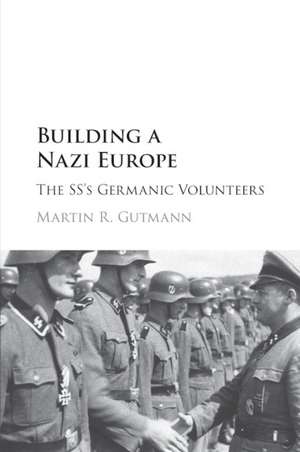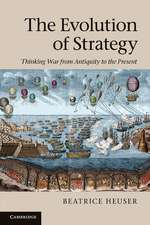Building a Nazi Europe: The SS's Germanic Volunteers
Autor Martin R. Gutmannen Limba Engleză Paperback – 19 dec 2018
| Toate formatele și edițiile | Preț | Express |
|---|---|---|
| Paperback (1) | 283.25 lei 6-8 săpt. | |
| Cambridge University Press – 19 dec 2018 | 283.25 lei 6-8 săpt. | |
| Hardback (1) | 693.69 lei 6-8 săpt. | |
| Cambridge University Press – 25 ian 2017 | 693.69 lei 6-8 săpt. |
Preț: 283.25 lei
Nou
Puncte Express: 425
Preț estimativ în valută:
54.20€ • 59.06$ • 45.67£
54.20€ • 59.06$ • 45.67£
Carte tipărită la comandă
Livrare economică 23 aprilie-07 mai
Preluare comenzi: 021 569.72.76
Specificații
ISBN-13: 9781316608944
ISBN-10: 1316608948
Pagini: 253
Dimensiuni: 153 x 230 x 15 mm
Greutate: 0.35 kg
Editura: Cambridge University Press
Colecția Cambridge University Press
Locul publicării:New York, United States
ISBN-10: 1316608948
Pagini: 253
Dimensiuni: 153 x 230 x 15 mm
Greutate: 0.35 kg
Editura: Cambridge University Press
Colecția Cambridge University Press
Locul publicării:New York, United States
Cuprins
Introduction; 1. Germanic dreams: the Waffen-SS and foreign recruitment; 2. Restless youth: prewar biographical sketches; 3. Joining the burgeoning Waffen-SS; 4. Building a Germanic Europe; 5. Molding the Germanic political soldier; 6. The end of the Germanic project; Conclusion.
Recenzii
'That not only Germans engaged in Hitler's genocidal reorganization of Europe is well established, but we still know only little about the specter and the mindsets of non-Germans eagerly fighting for it. Gutmann's meticulously researched inquiry into Swiss, Swedish and Danish SS volunteers is a milestone in the long overdue transnational history of this crucial dimension of Nazi terror in Europe - a model study that will spur others to come.' Thomas Kühne, Clark University, Massachusetts
'Building a Nazi Europe is a highly innovative study on 'Germanic' volunteers in one of the most notorious military formations of the twentieth century: the Waffen-SS. Based on meticulous and extensive archival research in several countries, Gutmann's book sheds new light on those men who were neither coerced nor drafted into Hitler's crusade against the Soviet Union, but voluntarily left their homes in neutral countries to fight for the Nazi cause. In exploring the volunteers' backgrounds and expectations for the New Order, the book makes a significant contribution to the flourishing debate about the transnational dimension of the Nazi project of violently transforming the European continent.' Robert Gerwarth, University College Dublin
'As nationalist authoritarianism surges around the world, historians need to look in much more depth at the post-war history of the far right. Studies like Building a Nazi Europe will be essential starting points.' Steven P. Remy, German History
'Despite the continuous avalanche of Third Reich studies, the intensive study of even a sliver of the SS volunteers from neutral Sweden, Denmark, and Switzerland in the hands of a skilled historian illuminates new contradictions of the Nazi bureaucracy. This well-researched and elegantly written study is based on the stories of a hundred of the most influential and high-ranking volunteers from those three countries outside Germany's sphere, and reveals the tension between national loyalty and the SS's obsession with a racial Germano-centric plan for Nazi-occupied Europe. In spite of the neutrality of the countries and their volunteers, and the clear inequality of the volunteers in the German Waffen-SS, they became enthusiastic participants in the Holocaust. … A significant contribution to the examination of the stresses of fascism and nationalism run amuck … Highly recommended. All academic levels/libraries.' A. P. Krammer, Choice
'Building a Nazi Europe contains much of interest to scholars and readers interested in transnational European history, transnational fascism, and the complex realities of wartime history and memory in Denmark, Sweden, and Switzerland during and after the Second World War. Gutmann concludes his work with a series of pointed insights … Given Europe's current political turmoil, and what is known of transnational cooperation among far-right political groups today in Europe, the troubling historical precedents unearthed by Building a Nazi Europe are worthy of considerable attention.' H-War
'Gutmann's book provides new insight into the attitudes and responses of a particular category of Western European volunteers. It also deserves credit for drawing attention to the non-Germans' impact on the ideology, policies and inner dynamics of the SS.' Sigurd Sørlie, European History Quarterly
'The book as a whole is highly original, illuminating and well‐written. Above all, it sheds fresh light on transnational developments in the history of the Third Reich and the history of fascism more generally, as well as highlighting lesser‐known institutions within the SS's colonial apparatus. Ultimately, Gutmann demonstrates that the logical conclusion of Nazi chauvinism utterly precluded true respect and cooperation between nations - illuminating the fundamental incoherence of the competing visions of a New Europe which lay at Nazism's heart.' Helen Roche, History
'Building a Nazi Europe is a highly innovative study on 'Germanic' volunteers in one of the most notorious military formations of the twentieth century: the Waffen-SS. Based on meticulous and extensive archival research in several countries, Gutmann's book sheds new light on those men who were neither coerced nor drafted into Hitler's crusade against the Soviet Union, but voluntarily left their homes in neutral countries to fight for the Nazi cause. In exploring the volunteers' backgrounds and expectations for the New Order, the book makes a significant contribution to the flourishing debate about the transnational dimension of the Nazi project of violently transforming the European continent.' Robert Gerwarth, University College Dublin
'As nationalist authoritarianism surges around the world, historians need to look in much more depth at the post-war history of the far right. Studies like Building a Nazi Europe will be essential starting points.' Steven P. Remy, German History
'Despite the continuous avalanche of Third Reich studies, the intensive study of even a sliver of the SS volunteers from neutral Sweden, Denmark, and Switzerland in the hands of a skilled historian illuminates new contradictions of the Nazi bureaucracy. This well-researched and elegantly written study is based on the stories of a hundred of the most influential and high-ranking volunteers from those three countries outside Germany's sphere, and reveals the tension between national loyalty and the SS's obsession with a racial Germano-centric plan for Nazi-occupied Europe. In spite of the neutrality of the countries and their volunteers, and the clear inequality of the volunteers in the German Waffen-SS, they became enthusiastic participants in the Holocaust. … A significant contribution to the examination of the stresses of fascism and nationalism run amuck … Highly recommended. All academic levels/libraries.' A. P. Krammer, Choice
'Building a Nazi Europe contains much of interest to scholars and readers interested in transnational European history, transnational fascism, and the complex realities of wartime history and memory in Denmark, Sweden, and Switzerland during and after the Second World War. Gutmann concludes his work with a series of pointed insights … Given Europe's current political turmoil, and what is known of transnational cooperation among far-right political groups today in Europe, the troubling historical precedents unearthed by Building a Nazi Europe are worthy of considerable attention.' H-War
'Gutmann's book provides new insight into the attitudes and responses of a particular category of Western European volunteers. It also deserves credit for drawing attention to the non-Germans' impact on the ideology, policies and inner dynamics of the SS.' Sigurd Sørlie, European History Quarterly
'The book as a whole is highly original, illuminating and well‐written. Above all, it sheds fresh light on transnational developments in the history of the Third Reich and the history of fascism more generally, as well as highlighting lesser‐known institutions within the SS's colonial apparatus. Ultimately, Gutmann demonstrates that the logical conclusion of Nazi chauvinism utterly precluded true respect and cooperation between nations - illuminating the fundamental incoherence of the competing visions of a New Europe which lay at Nazism's heart.' Helen Roche, History
Notă biografică
Descriere
A compelling account of the men who worked and fought for Nazi terror organization, the SS, during the Second World War.









